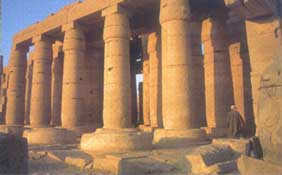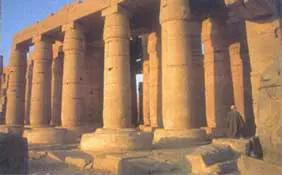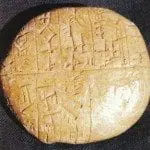Did Moses really write Genesis?
A deadly hypothesis denying that Moses had anything to do with Genesis, based on spurious scholarship, is still widely being taught to future Christian leaders.

Egyptian ruins. Who wrote Genesis? Internal evidences in the text of the Pentateuch indicate that the author was familiar with Egyptian customs, as would be expected of Moses.
Nearly all liberal Bible colleges and seminaries, and sadly some which profess conservative evangelical doctrine, approvingly teach the ‘documentary hypothesis’, also known as the ‘JEDP hypothesis’.
What is the documentary hypothesis?
This is the liberal/critical view which denies that Moses wrote Genesis to Deuteronomy. It teaches that various anonymous authors compiled these five books (plus other portions of the Old Testament) from centuries of oral tradition, up to 900 years after Moses lived (if, in this view, he even existed). These hypothetical narrators are designated as follows:
- J (standing for what the documentary hypothesists would term Jahwist) supposedly lived about 900–850 BC. He/she/they allegedly gathered the myths and legends of Babylon and other nations, and added them to the ‘camp-fire stories’ of the Hebrews, producing those biblical passages where the Hebrew letters YHWH (‘Jehovah’) are used as the name of God.
- E (standing for Elohist) supposedly lived about 750–700 BC in the northern kingdom (Israel), and wrote those passages where ’Elohim is used as the word for God.
- D supposedly wrote most of Deuteronomy, probably the book found in the temple in Jerusalem in 621 BC. (2 Kings 22:8).
- P supposedly represents a Priest (or priests) who lived during the exile in Babylon and allegedly composed a code of holiness for the people.
- Various editors R (from German Redakteur) supposedly put it all together.
The idea of multiple authorship of these books was first proposed by Jean Astruc in Paris in 1753. However, the foremost exponent was Julius Wellhausen (1844–1918), who ‘restated the Documentary Hypothesis … in terms of the evolutionary view of history which was prevalent in philosophical circles at the time’.1,2 He claimed that those parts of the Old Testament that dealt with sophisticated doctrine (one God, the Ten Commandments, the tabernacle, etc.) were not truth revealed by the living God, but were ideas that evolved from lower stages of thinking, including polytheism, animism, ancestor worship, etc.3 Hence the ‘need’ to find or fabricate later authors. One of the main arguments was that writing had supposedly not been invented yet at the time of Moses.
Thus the documentary hypothesis undermines the authenticity of the Genesis Creation/Fall/Flood accounts, as well as the whole patriarchal history of Israel. It presupposes that the whole of the Old Testament is one gigantic literary fraud, and calls into question not only the integrity of Moses, but also the trustworthiness/divinity of Jesus (see point 5 below). No wonder the critics have embraced it so warmly!
Was Moses J, E, D, P, or R?
Answer: He was none of the above. Rather, Moses himself was both writer and editor of the Pentateuch, and these five books were composed by him in about 1400 BC , not by unknowns at the time of the Exile. This does not mean that Moses did not use other written sources available to him (see later), or that he wrote the last few verses of Deuteronomy 34 that record his death. Talmudic (Rabbinic Jewish) tradition has always been that these were added, under divine inspiration, by Joshua.
There is no external evidence at all in support of J, E, D, P, or R. What were their names? What else did these alleged literary savants write? History, both Hebrew and secular, knows nothing of them. They exist only in the fertile imaginations of the inventors of the documentary hypothesis.
Evidence for Moses authorship of the Pentateuch

Clay tablets like this were ideal for long-term written records. Far from ‘Flintstones’ clumsiness, these could be held in one hand.
Patriarchal records may have been carried on the Ark, later used by Moses in compiling Genesis (under inspiration).
The evidence that Moses wrote the Pentateuch, often referred to in the Bible as ‘the Law’ (Hebrew torah), is overwhelming:
- Contrary to the views of Wellhausen and others, archaeological research has established that writing was indeed well known in Moses’ day. The JEDP hypothesis falsely assumes that the Israelites waited until many centuries after the foundation of their nation before committing any of their history or laws to written form, even though their neighbours kept written records of their own history and religion from before the time of Moses.4
- The author is obviously an eyewitness of the Exodus from Egypt, familiar with the geography,5 flora and fauna of the region;6 he uses several Egyptian words,7 and refers to customs that go back to the second millennium BC.8
- The Pentateuch claims in many places that Moses was the writer, e.g. Exodus 17:14; 24:4–7; 34:27;Numbers 33:2; Deuteronomy 31:9, 22, 24.
- Many times in the rest of the Old Testament, Moses is said to have been the writer, e.g. Joshua 1:7–8; 8:32–34; Judges 3:4; 1 Kings 2:3; 2 Kings 14:6; 21:8; 2 Chronicles 25:4; Ezra 6:18; Nehemiah 8:1; 13:1; Daniel 9:11–13.
- In the New Testament, Jesus frequently spoke of Moses’ writings or the Law of Moses, e.g. Matthew 8:4; 19:7–8; Mark 7:10; 12:26; Luke 24:27, 44; John 5:46–47; 7:19. Jesus said that those who ‘hear not [i.e. reject] Moses’ would not be persuaded ‘though one rose from the dead’ (Luke 16:31). Thus we see that those churches and seminaries which reject the historicity of Moses’ writings often also reject the literal bodily resurrection of the Lord Jesus Christ.
- Other New Testament speakers/writers said the same thing, e.g. John 1:17; Acts 6:14; 13:39; 15:5; 1 Corinthians 9:9; 2 Corinthians 3:15; Hebrews 10:28.
Does this mean that Moses wrote Genesis without reference to any previous information? Not necessarily. Genesis comprises narratives of historical events that occurred before Moses was born. Moses may very well have had access to patriarchal records and/or reliable oral traditions of these events. In that case, such records would certainly have been preserved by being written (probably on clay tablets) and handed down from father to son via the line of Adam-Seth-Noah-Shem-Abraham-Isaac-Jacob, etc.
There are 11 verses in Genesis which read, ‘These are (or ‘This is the book of’) the generations of …’ The Hebrew word toledoth translated ‘generations’ can also mean ‘origins’, ‘history’, or even ‘family history’, and each verse comes either before or after a description of historical events that involved the person named.9 The most likely explanation is that Adam, Noah, Shem, etc. each wrote an account of the events that occurred either right before or during his lifetime, and Moses, under the infallible inspiration of the Holy Spirit, selected, compiled, and edited these to produce Genesis in its present cohesive form.10
Genesis does not show a progress from idolatry to monotheism, as Wellhausen’s evolutionism requires. Rather, the Bible begins with an original revelation of God, which was later rejected to the point that the Hebrew nation itself descended into idolatry and so was given over to captivity by God.
What about the different words used for God?
Let us consider this in Genesis chapters 1 and 2. The word ’Elohim is used for God 25 times in Genesis 1:1–2:4a.11 It has the idea of an awesome and faithful Being, having creative and governing power, majesty and omnipotence, who is above the material world He created. It is a lofty title (= ‘God’) and is the appropriate word for Moses to have used for the first factual report of God’s creative activities.12
In Genesis chapter 2 from verse 4, the Hebrew uses the letters YHWH to refer to God. Sometimes translated ‘Jehovah’, it is more often translated ‘LORD’ (in small capitals), and is the most commonly used term for God in the Old Testament (6,823 times). It means ‘the One who always was, now is, and ever shall be’ and is the deeply personal name of God. It is therefore used in His personal and covenant relationships with people. Genesis 2:4b ff is the detailed account of how God made Adam and Eve, and of the setting He prepared for them.13 Here they were meant to live and work in loving covenantal fellowship with Him14 and with each other. It was entirely appropriate therefore that Moses should have used YHWH in writing this section of Genesis. In Genesis 2, YHWH is joined to ‘Elohim to form the compound name YHWH-’Elohim (= the Lord God). This identifies the covenant God YHWH as being one and the same as ’Elohim, the almighty creator. There is no logical reason (particularly any based on the term used for God) to ascribe this account to any other author(s).
The same principles apply in the rest of Genesis and throughout the Old Testament.
The JEDP system is self-contradictory, as its proponents need to break verses into sections and even credit parts of sentences (that use more than one term for God) to different writers. Such a hotchpotch would be unique in ancient Middle Eastern literature.
The ‘scholarship’ used to promote the documentary hypothesis would be laughed out of court if applied to any other ancient book!
Computer agrees: Genesis had only one authorThe following quote comes from Omni magazine of August 1982:
|
Conclusion
Ultimately, the author of Genesis was God, working through Moses. This does not mean that God used Moses as a ‘typewriter’. Rather, God prepared Moses for his task from the day he was born. When the time came, Moses had all the necessary data, and was infallibly guided by the Holy Spirit as to what he included and what he left out. This is consistent with known history, and with the claims and principles of Scripture (2 Timothy 3:15–17; 2 Peter 1:20–21).
On the other hand there is no historical evidence, and no spiritual or theological basis whatsoever for the deceptive JEDP hypothesis. Its teaching is completely false; the ‘scholarship’ that promotes it is totally spurious. Propped up by the theory of evolution, it exists solely to undermine the authority of the Word of God.
References and notes
- Josh McDowell, More Evidence that Demands a Verdict, Here’s Life Publishers, 1981, p. 45.
- Notable exponents of Wellhausenism were Samuel R. Driver in England (1891), and Charles A. Briggs in the USA (1893). Since Wellhausen’s time, other liberal critics have ‘found’ up to 40 alleged contributors to the Pentateuch, including an Edomite source S and a Canaanite source K — there are almost as many subdivisions as there have been ‘experts’ finding sources!
- Adapted from Dave Breese, Seven Men Who Rule the World from the Grave, Moody Press, Chicago, 1990, pp. 89 ff.
- Adapted from Gleason Archer, Encyclopedia of Bible Difficulties, Zondervan, Michigan, 1982, pp. 51–52.
- In Genesis 13:10 the Jordan valley is compared with ‘the land of Egypt, as thou comest unto Zoar’—appropriate only for readers unfamiliar with the Jordan Valley in Palestine but acquainted with Egypt. Hence written near the time of the Exodus from Egypt, not many centuries later.
- The crop sequence in Exodus 9:31–32 is Egyptian, not Palestinian. The trees and animals referred to are mostly indigenous to Egypt or the Sinai Peninsula, not Palestine, e.g. the acacia tree, used for the tabernacle furniture, is native to Egypt and Sinai, but is hardly found in Canaan, except around the Dead Sea. The skins prescribed for the outer covering of the tabernacle in Exodus 26:14 (Hebrew tachash), were most likely those of the dugong or sea cow (Zool. Sirenia)—found in the sea adjacent to Egypt and Sinai but foreign to Palestine. See ref. 4, p. 46 ff.
- More Egyptian loan words are found in the Pentateuch than anywhere else in the Bible, as would be expected if the author was Moses ‘learned in all the wisdom of the Egyptians’ (Acts 7:22). The very name ‘Moses’ is Egyptian not Hebrew (Exodus 2:10).
- There is no mention in the Pentateuch of the temple, or that Jerusalem would be its future location — the only centre of worship mentioned was the tabernacle, a tent.
- Genesis 2:4; 5:1; 6:9; 10:1; 11:10; 11:27; 25:12; 25:19; 36:1; 36:9; 37:2. The first of these, ‘These are the generations of the heavens and the earth’ (Genesis 2:4), does not mention a human name, as no man was present during Creation Week until day six. The information was probably revealed by God to Adam, who then recorded it (ref. 10).
- Henry Morris, The Genesis Record, Baker Book House, Grand Rapids, Michigan, 1976, pp. 22–30; also Prof. Dr. F.N. Lee, personal communication, April 1998.
- ’Elohim is a Hebrew plural form meaning ‘two or more’. In Genesis 1:1 it occurs with the verb ‘created’ (Hebrew bara’) in the singular form. It is thus a plural noun with a singular meaning, suggesting the uni-plurality of the Godhead. The Christian doctrine of the Trinity is thus foreshadowed in the Bible right from the very first verse. See also the use of the word ‘us’ in Genesis 1:26 and 11:7.
- Note that the power of God associated with the use of this word is seen much more clearly in His having created the vast contents of space, as well as the astounding complexities and minutiae of life on Earth, in the short timespan of Creation Week, rather than in any long-drawn-out evolutionary timetable. See C.V. Taylor, The First 100 Words, The Good Book Co., Gosford, NSW, Australia, p. 3, 1996.
- There is no contradiction between Genesis 1 and 2. In Matthew 19:3–6, Jesus quoted from both accounts together, 1:27 and 2:24, showing them to be equally authoritative and fully supplementary. See also D. Batten, ‘Genesis Contradictions?’ Creation 18(4):44–45, 1996; R.M. Grigg, ‘Should Genesis be taken literally?’ Creation 16(1):38–41, 1993.
- Cf. Hosea 6:7: ‘But they like men [Hebrew: literally ‘like Adam’ or ‘in Adam’] have transgressed the covenant …’







